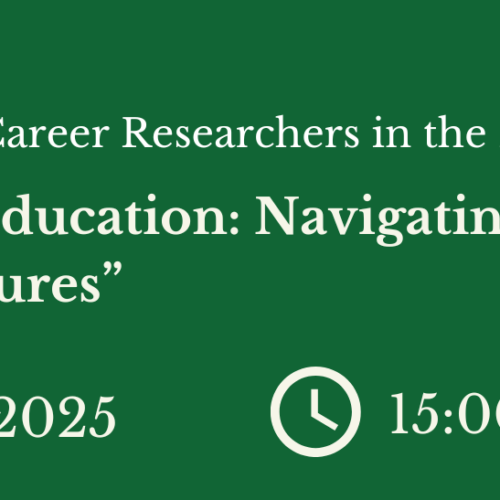History of Knowledge in the History of Education (2022 – 2027)
Convenors: Jona Tomke Garz (Switzerland); Fanny Isensee, (Germany); Joakim Landahl (Sweden); Björn Lundberg (Sweden); Daniel Töpper (Germany)
History of Knowledge – Report Workshop in Zurich 2024 by Ina Hasenöhrl (University of Zurich), Fanny Isensee (Humboldt-Universität zu Berlin) and Daniel Töpper (Humboldt-Universität zu Berlin)
History of Knowledge in the History of Education – Annual Report 2023
History of Knowledge in the History of Education – Annual Report 2022
Description and Main Objectives: Until recently the history of education was largely a history of ideas and not seldomly narrated as a ‘whig history’, leaving past practices and their inscribed knowledge(s) as well as non-traditional actors, actants, and knowledge on the margins of the academic discipline. Among the promising new(er) approaches broadening the scope of the history of education is the history of knowledge. A special issue of the Nordic Journal of Educational History (edited by Björn Lundberg, scheduled to be published in the fall of 2022) addresses the role of the emerging history of knowledge perspective for the history of education. Taking this further the proposed Standing Working Group (SWG) seeks to ask which new questions, specific methods and methodologies, theoretical insights and possible case studies could be added to the state of the art within the discipline. This includes exploring ways in which established theories, sources 4 0 and narrations can be questioned, revisited, and updated. Further, we suggest that histories of knowledge may work to broaden the scope of research on institutions, teaching and learning structures to include less formal arenas of education, actants of teaching and forms of instruction and knowledge outside of academia. In particular, our proposed Standing Working Group seeks to integrate new sources (e.g. Haasis & Rieske, 2015), new methodological approaches (e.g. Fenwick & Edwards, 2012; Füssel & Neu, 2021) and theories (e.g. Füssel 2019; Füssel et al., 2019; Östling et al., 2020; Sarasin, 2011) into the history of education. The SWG will work with newly highlighted sources (like pre-printed forms, exhibitions, data visualizations) as well as revisit already established types of sources (like statistical data (Lawn, 2014), personal files (Garz, 2022)), subaltern/precarious forms of knowledge (Caruso, forthcoming) and diverse topics that lend themselves to further exploration. Thereby, the SWG can add to a wider theoretical discussion on where history of knowledge, cultural and material histories of education, discourse history, history of ideas, history of science or learning differ and in turn clarify the specifics of all these perspectives (Daston, 2017; Heilbron, 2019; Joas et al., 2019). We want to ask and continuously work on the question “What does history of education have to offer for the history of knowledge and vice versa?” and specifically focus on knowledge practices (the emergence, usage, and distribution/circulation/transfer of educational and institutional knowledge) within and beyond academia. We further want to attempt to assemble methods and methodologies of history of knowledge, clarify underlying beliefs and popularize this approach in history of education research. What does it mean to write histories of knowledge and in which ways is this a specific approach/methodology? The Standing Working Group would like to initiate and invite debates and scholarly exchanges on different forms of educational knowledge, their production, dissemination, consumption, application and entanglements as well as the means of analyzing the knowledge(s) and their intersections. With this plan in mind, the proposed SWG could further allow to question established hierarchies and spaces of knowledge and education. Moreover, the SWG could as well be very valuable to the study of circulation or communication of knowledge in society by shifting the attention from scientific discovery or production of knowledge to arenas where knowledge is taught and used. Activities The convenors can rely on international and interdisciplinary scholarly expertise in the domain of history of knowledge. Aside from several publications in the field, they have successfully organized a number of activities at ISCHE conferences (such as presentations, pre-formed panels, and the Twitter conference #twISCHE42). In the future, we would like to organize one or two pre-conference workshop(s) on theoretical and methodological aspects of the approach and plan a publication based on the workshop(s). History of knowledge – understood as an approach interested in the role of knowledge in society and human life – also asks for means and ideas to spread and integrate knowledge from outside of academia. Thus, this involves questions on interconnections between academic, popular, activist, practical and other types of educational knowledge. Therefore, we suggest implementing third mission activities on Twitter and the usage of popular media such as podcasts (e.g. FreshEd, HistEdOnAir). If possible, we would also be interested in adding to ISCHE’s blog, aim for follow-up publications and attempt collections on articles and special issues on case studies within the framework of the perspective. Another possible outcome is to establish history of knowledge as a new methodological frame within history of education by inviting historians of science, media historians and book historians to our discussion. This in turn could foster new interdisciplinary cooperation, connecting ISCHE to a larger academic discourse, possibly even making it a core arena for research on histories of knowledge. This dialogue could be further enhanced by planning conferences that focus on the intersection between history of education and history of knowledge. Ultimately, the SWG would like to open up and discuss further avenues for histories of knowledge, advance the interest in this approach within ISCHE, raise awareness for known and unknown structures of knowledge, and connect ISCHE with other disciplinary discussions and actants as well as its own subaltern past and present.
For additional information and to become involved, please contact the convenors: Jona Tomke Garz (Switzerland), Fanny Isensee (Germany), Joakim Landahl (Sweden), Björn Lundberg (Sweden), Daniel Töpper (Germany)


